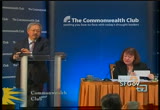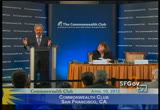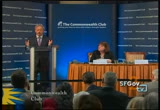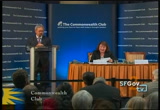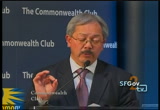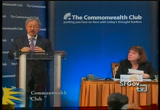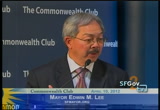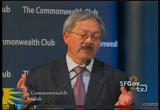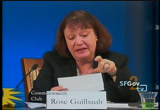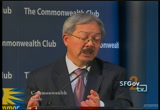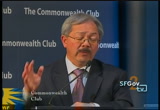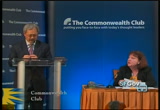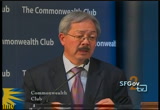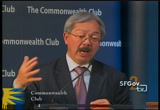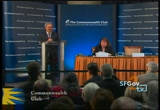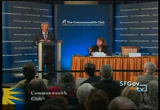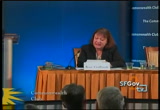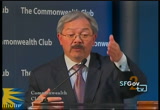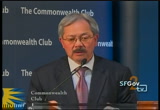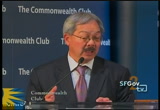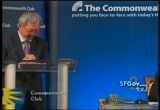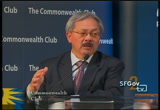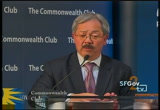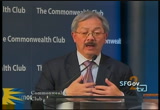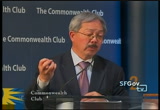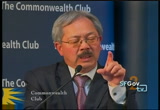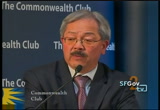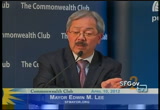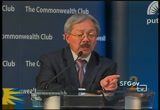tv [untitled] February 18, 2013 8:00pm-8:30pm PST
8:00 pm
radio program. our guest is mayor and the -- ed lee, discussing the future of san francisco. here is a question about transportation. you did speak about muni. this question is about high- speed rail. do you support it? do you think it is the right way to go? >> let me tell you, right now our future economy is dependent upon of high-speed rail. let me tell you why. 1/3 of the traffic at our san francisco airport is due to the commute between los angeles and san francisco. we cannot expand the runways at the airport. we have agreed we would never be permitted to do that even if we wanted to. we're not going to be able to
8:01 pm
expand our airport. our new economy is dependent upon international flights increasing. we cannot get more international flights into san francisco unless we move the l.a.-san francisco commute off of the airlines and on to high-speed rail. 1/3, that is what we're betting on. if we can get high-speed rail out there and move that off, we will include -- increase our air flights. that is our theory. i believe strongly in that. we have 10 of the largest cities in california in agreement with us that we will be the northern terminal for high-speed rail reading l.a. and san francisco. a lot more details to be had.
8:02 pm
palo alto wants us to work with them on the first phase. we will do that and respect the needs of the peninsula as we move along. the ultimately, we will get to high-speed rail. that will be a benefit. that is my economic argument for why we need high-speed rail. it is important for our future. >> automobiles, bicycles, and pedestrians are having problems on the street. they seem to have a problem coexisting. what are your plans to solve the problem? what are your plans to make it easier for bicyclists to use that as a form of transportation in the city? >> i am a great supporter of additional bicycle lanes in the city. the responsibility for safety on
8:03 pm
the road is both bicyclists and car drivers. it has to be a shared responsibility. it cannot be finger-pointing. a bike inappropriately used and abused can kill. it has happened twice. we will take the hot spots of the city. we know where they are because that is where the accidents are reported. we will give a higher level of visible education and enforcement at the hot spots for everybody. muni drivers, car drivers, and bicyclists in those hot spots will learn through a high level of enforcement by our officers. we have agreed to that approach already. we have an agreement with the bicycle coalition as well as the police department and walk sf,
8:04 pm
the pedestrian groups, the slowdown groups. they're all in dazed with us to make the streets safer -- they are all in agreement with us to make the streets safer. you will see an increased focus on the hot spots. there are hot spots along market street and everywhere else. it will signal a shared responsibility by everyone. everyone has to learn to be educated. we will start with education. we will get very deliberate. i think it will save lives. it will create a culture where everybody has to respect each other's views of the road. >> you alluded to the former mayor who said he would solve the muni problem in 100 days.
8:05 pm
he will not make that mistake, but what will you do to fix it? >> i meet regularly with mta. i have sessions with their board members as well. one is to make sure they pay very serious attention to their economics, that they build reserves to spend money on their assets, the trains, cars, and trucks. they do not have labour practices that are not efficient and keep every example of excessive and abusive things, that they take care of it. these are simple ways of how you run a corporation. you do not allow bad things to happen or get out of control. the new have balance sheets. you have to go through the discipline. -- then you have balance sheets. you have to go through the discipline.
8:06 pm
it sounds overly simple. you can imagine how we got out of what -- whack for some many years. the trains and trucks were not invested in. somebody made the decision along the way to give raises. that is why we put them out independently, so they would not be political decisions made. it would be business decisions made. while we're doing that, part of the solution is technology use. we have already invited sf city to help us tackle through hackatons to innovate in ways never thought of before. muni is more than just buses, it is taxis and bicycle lanes.
8:07 pm
as complicated as the system is, we're starting to get great ideas on how to improve parking and transit in more than one way. i think we're going to use technology to help guide buses and trolleys to get places on a more responsible timeframe. that is the number-one question every time i meet with employees of a new technology company, how we're going to improve muni. half of them write it to work. if they're going to spend 15 hours at work, they have to do it at work and not on muni. >> we were talking about the america's cup. they are pulling back on what they're doing in the city. i have a couple of questions related. this person wants to know how that will affect small businesses. there is an overall interest in how san francisco will support
8:08 pm
the burdens of small business. >> we're still working with america's cup to make sure small businesses do get a shot at this great event. it has been scaled down to the tune of $100 million. we will not have the investment in some of the piers we wwanted. it does not mean the excitement and capacity will be less than we predicted. there will be a lot of people in town. you should hear some of the exciting things. there will be unveiling of the large boats fleet week this october. there will be a lot of people excited about that. they will be unveiling the boats that will be in the races. i think we're still going to do a lot of outreach about how
8:09 pm
small businesses can be a part of the great event. that is ongoing. that is a promise we made. we will continue doing that. we also are supporting small businesses in a variety of ways. a few weeks ago, we introduced as part of my economic plan of the small business loan program, we got the first $1 million passed by the board of supervisors a few weeks ago. when the new budget is passed, we will have that as part of the budget. it is a full $5 million small- business loan program. many small businesses are suffering. i hate seen vacancies in the small business corridors. we have to get to incentivizing business to get in there. i have and investing in
8:10 pm
neighborhoods strategy. we will use the loan program to incentivize that. i think we will get a lot of bang for the buck. scores of companies are lined up to get help. the loans will go fast. the board has devised us there will be more to come if those businesses get activated. it will be producing a lot more jobs. >> you are listening to the commonwealth club of california radio program. mayor ed lee is discussing the future of san francisco in his first elected term as mayor. san francisco is one of the most expensive cities in the united states. now we have a huge rental bubble going on. what is the city doing to promote affordable housing? >> we have a big setback when redevelopment was eliminated. i complained with 10 other big
8:11 pm
mayors. the governor had to do it we were doing the right thing. we never got criticized for anything. that redevelopment agency used tax increments, which borrows from future tax increases on property they declare to be redeveloped areas, it uses that to build infrastructure. that is exactly how we built mission bay. that is how we're going about hunters point, treasure island. these very successful projects provided us with a number of sites that build affordable housing for middle-income and just below middle income levels and even into almost housing authority levels. when we lost it, we have to figure out what we would do.
8:12 pm
i created the housing trust fund working group. the idea is to rebuild up extreme of $50 million in revenue -- 8 stream of $50 million in revenue to build affordable housing. we have to get it done. the housing trust fund includes every major real estate management company, a developer of condos, affordable housing advocates, financial institutions. all are in the room debating about the best ideas. hopefully in the next couple months, we will unveil what we think would be the best ideas to go forward to create a stream for blood -- for affordable housing. my job is to keep everybody from not killing each other in the same room. some of them have argued
8:13 pm
stances they have battled over for a decade. i have issues in their light -- like condo conversions. i told them to keep their eye on the ball. everybody wants more affordable housing. let's keep our ideas where we can make an agreement. i think we will come up with good ideas. we have some very smart people in the city. i will not let that go by allowing them to take political positions. >> education has taken a beating recently. what are your plans in terms of budget cuts and balancing those for education in the city? >> they will continue taking beatings. guess what the state will do if you do not pass the taxes? they will cut into the tens of millions. the federal government is not having enough money. they will wait until after the elections before they say anything.
8:14 pm
we do not have a good picture about what our public school district is going to experience in the next year, except i think it is always going to be challenging. that is why i said the economics of the school district have to be front and center. they have to make better economic decisions. i have to be proud of them. the school board made some decisions about the layoffs of two weeks ago. they decided they will challenge the seniority. they did a decision that upset the school teachers union. they felt the quality of the schools, especially where there were historic challenges to the performance of the students, that was going to be number one thing they have to pay attention to. i think they're headed in the right direction. i will not debate we will always have to be in disagreement with the teachers' union.
8:15 pm
i do not think we should be. i think they care about students and performance. what has to be front and center is the quality of the schools. that will ring true when people decide whether they will stay in the city. the quality of the schools have to be there. it is partly funding, practices, investments. i want to be part of a huge number of people in this town who want our education system to be the best. after we start the employment training, we're also going to help -- hopefully the next challenge is how to get better schools to perform even better at sustained levels. we do not have all the answers. we will work with everybody to get there. >> san francisco has a lot of visitors along with the residents. this question is about fees and how much they have gone up.
8:16 pm
they feel is excessive. is there anything that can be done about that? >> i try not to incur any tickets. [laughter] i will tell you this. the latest to get citation increase was not our doing, just to let you know that. they had to increase it. it was because the state of california passed on something they felt they could not deal with on their budget. they grabbed a portion of our ticket revenue. just to keep the same level of revenue, we have to increase our ticket citations to recover from what the state did to them. i asked why and explain to me that was the reason.
8:17 pm
-- and they explained to me that was the reason. i said during the debate i was frustrated. i did not want a city that would fee everybody to death. i have invited technology companies to work sessions. they are the ones affected as well. how can we avoid fee increases and maintain the level of muni where they can invest in assets and do what we want them to do? we have to come up with new ideas. we're trying to hold the line. we do not have a lot of choices. everyone is still operating on a deficit. there are compromises going on. i did not want them to do parking meters on sundays. the compromise will start at 12:00. some people go to church earlier. i am a little frustrated with that. i thought we could leave
8:18 pm
sunday's alone. a lot of businesses have opened up on sundays because they want to attract more people. >> we have a vibrant film industry. this person would like to know the plans to revitalize the film industry. >> our film director is doing a really good job. she helped create a film incubator in a market where we are offering independent filmmakers low-cost working spaces. out of that, we are recreating independent filmmaking. at the same time, we have a successful rebate program going on. we're in the middle of reviewing whether we can find that the rebate to attract more major films to come into san
8:19 pm
francisco. that is ending this year. we're in the beginning of the conversation in this budget about whether we can afford to put that investment in. maybe i am letting a little bit of what my values are out there. i do think the successful film industry -- i cannot stand a film that should be made in san francisco but they made it in vancouver. why have an alcatraz that is not really out the trash? -- it is not really alcatraz? we still have one of the have ot beautiful places. i am also investing in china sf, by the way. i want some of those companies from across the world to come and fell san francisco, the real
8:20 pm
san francisco, and make movies for people in china and japan and all over the world -- come to film san francisco. we have some interesting enticements' going on about how we can get them over here. and being the first chinese mayor, i'd better get some chinese filmmaker to come here. [laughter] otherwise, i miserably failed, because i would love san francisco to be shown at 2 1 billion people in china, to show them about our history. because there is a connection there. they need to learn that. there will be a lot. everything from documentary's do -- i think this is exciting. i am letting you know a little bit of my excitement when it comes to films, that i am very interested to make sure we have an enliven film industry here in our city. >> 20 years ago i read an essay about san francisco being an asian city. and it took a long time to elect a nation-american may year. why do you think it took so long -- to elect an asian-american
8:21 pm
mayor. why do think it took so long? >> if you know the asian community, and this applies to chinese, japanese, filipino, korean, many of our previous generations came from countries that had a very hard, a kind of, sometimes, like for a better word, history of dictatorships. so when they come to america, and i have had these conversations with my parents, and they experience the freedom that americans have, they are going to be shy about politics. they are going to be shy about law enforcement. those are things that are not naturally things they engage with in their countries of origin. you have to know that history. once you understand that, there are generations of my parents and so forth that say we do not want you involved in politics. it is dirty.
8:22 pm
how can you compromise yourself when there are so many different interests of there? i think that generations have now over, those original, i think, of values that were part of a very live immigrant feelings and become much more comfortable with a challenge in political life. i will tell you this, and i get this a lot of times, people do ask me, including the chinese press and media. it is always, how do you feel about being the first chinese- american? i say, i know the history, and i am proud. but my challenge is to prove, to be candid with you, approve like with jeremy lin has done in the game of the national basketball, playing at that level. can you really play? and can you really be a team member and the leader of the court?
8:23 pm
for a chinese-american to be mayor of san francisco, you cannot just be a mayor of asians. you have to show that you can be the leader of latinos, gay and lesbian groups, african-american groups, technology interests, all the different varieties that make san francisco rich in diversity. you have to show that. and i think i am lucky because of the years that i was privileged to serve in different capacities, and i got the confidence of different mayors along the way to allow me those experiences. but now is the time to show that we can be the leader of a whole slew of different cultures. jewish, arab-american, africans from africa versus african american, and there are differences in that. i think that this culture of diversity is going to be the real challenge for asians and others who have historically not
8:24 pm
had these opportunities to show that we can be leaders, as jeremy lin can say, i play the game at the highest level, but i also know it is a team sport, and the team wins. what i pride myself in is i play as part of the team, too. i work really hard with my relationships with the board of supervisors. i work really hard at the diversity of corporate leadership and community leadership and neighborhood leadership we have in our city. it i am going to be successful, it is because every -- everybody else was willing to work with me. not because ed lee had a good idea or was willing to something -- to do something on his own. it takes collaboration. i will spread that to help in the leadership of the city. you have to appreciate that collaboration. that is how the city becomes successful. >> in 20 seconds, what has given you the most joy in the last 100
8:25 pm
days? >> [laughs] oh, gosh, the most joy? to be honest, i have to say that when i learned about people starting a business and creating a job, when i got some youth, some additional summer camp jobs that they did not have, that made me smile. that made me happy. because then they had a moment where their destinies were under what they performed and do, not by taking a political stance or necessarily having fun. for me, i think seeing people take a job opportunity and then create their own economic foundation and see their future, that they can kind of survive
8:26 pm
this city, all of this expensiveness but also have a self-determining factor is engaged in my philosophy of everybody getting a job. that makes me the happiest. every moment that i see it -- and i was telling ron earlier, i had a couple moments of the very happy today because this company called instagram started in san francisco and not bought by facebook for $1 billion. can you imagine the people that started that company and said, you know, our innovation here and what we did was worth $1 billion to somebody, and now we have facebook in san francisco? that makes me happy. because something that started really small, probably a couple of people started an idea and put their resources in, can be successful. and there is more of that to come with the excitement of our innovation companies while they hire send franciscans of all
8:27 pm
ages and backgrounds to be successful. i go back to saying giving people jobs, to me, is wonderful. the other thing i would say also makes me very happy, when people are successful, you are going to learn about where their values are. you know, i learned that lesson very vividly when i had a year to work with warren hellman. he used so much of his talent to reach the education gaps for people, to use the success of the concert he did in golden gate park. i learned so much from him when we worked together on pension reform. so when lending of red with tears in her eyes about homeless mothers, experiencing the life of homelessness -- when lynn benihoff read about that with tears in her eyes, about homeless mothers, and she made a challenge -- i think i was in office for like less than 20
8:28 pm
days, and she said, you know, i am going to challenge you, mayor. i am going to see whether you can do this. i am going to put up $1.5 million, and if you can match it and get these homeless families, particularly aimed at homeless mothers with kids, not only off the streets, off of your shelter list, i will put in my own money for that. and we went to work. and it was home for the holidays program that we had. we got these families starting to come in, and we're almost finished with that whole thing. i have been smiling ever since that. people's values come out. and i am so happy that the benihoff family has seen to it, and $100 million donation to ucsf. this company executives, if we can get them in early and they become successful and turn around and show their values on how they can help other people
8:29 pm
make the cities successful for them, that is what i am looking for in my very short four years. if i can get a few more examples out there, then we can complete the circle of success. make money here. city for the 100%. but also, if you do, helping somebody else. that is my philosophy. if i can use the mayor's office and bridge success for everybody, i will have more reason to smile as i crawled out of bed every morning to see what is going to happen to me. [laughter] >> our thanks to san francisco mayor ed lee. we think our audiences here on tv, radio, and the internet. now this meeting of the commonwealth club of california, the place where you are in the know, is adjourned. thank you. [applause] ♪
49 Views
IN COLLECTIONS
SFGTV2: San Francisco Government Television Television Archive
Television Archive  Television Archive News Search Service
Television Archive News Search Service 
Uploaded by TV Archive on

 Live Music Archive
Live Music Archive Librivox Free Audio
Librivox Free Audio Metropolitan Museum
Metropolitan Museum Cleveland Museum of Art
Cleveland Museum of Art Internet Arcade
Internet Arcade Console Living Room
Console Living Room Books to Borrow
Books to Borrow Open Library
Open Library TV News
TV News Understanding 9/11
Understanding 9/11